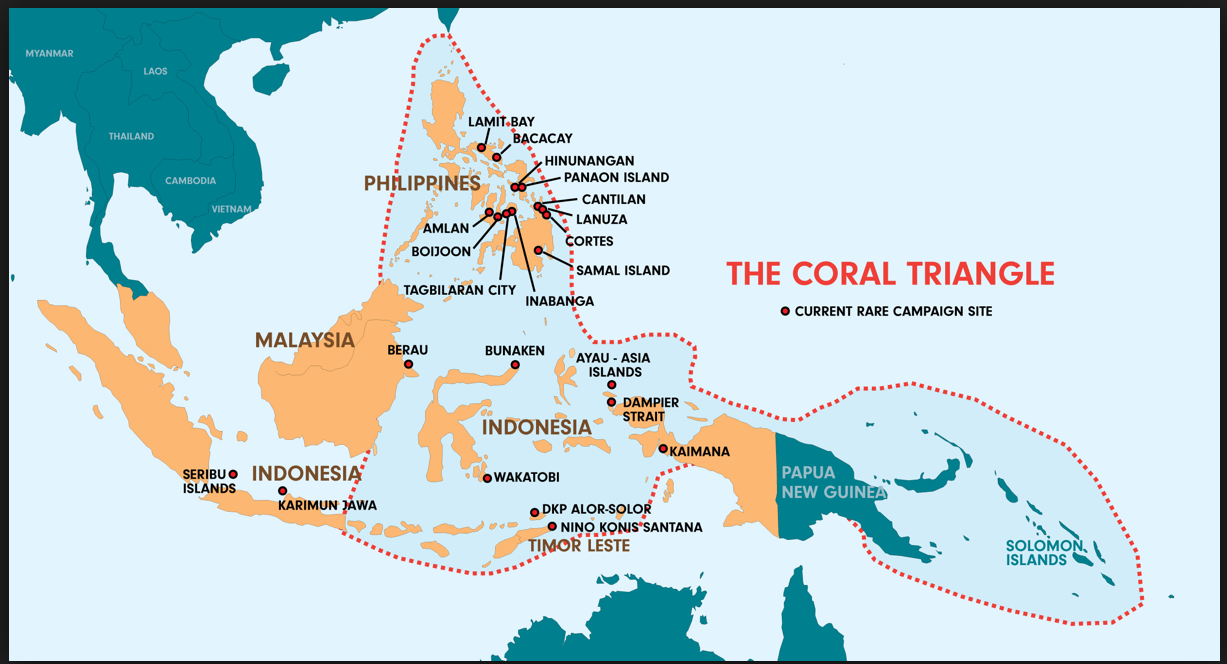Background
Indonesia, an archipelago consisting of more than 17,000 islands, is home to the richest marine biodiversity in the world. Located at the junction of the Indian and Pacific Oceans. The country's waters hold an astonishing variety of marine life and resources, including more than 3,000 species of fish and 600 species of coral. This extraordinary diversity is the result of complex geological, ecological, and climatic factors, making Indonesian waters a unique laboratory for studying marine ecosystems. Researchers from around the world are drawn to this rich habitat and conduct research in an effort to understand the complex relationships between marine species and their environments.
One important aspect of Indonesia's marine resources and biodiversity is its role as part of the World Coral Triangle, an area recognized globally for the diversity of its coral reefs and the many species that depend on this ecosystem. The Coral Triangle region supports nearly 30% of the world's coral reefs and an unrivaled diversity of marine biodiversity, including large predators such as sharks and tuna, as well as many small species. This area is not only important for marine conservation but also serves as an important resource for local communities, contributing to fisheries and tourism. The study of this biodiversity provides important insights into ecosystem resilience, adaptation, and the impacts of climate change, making it a rich area for research.

Source: https://mcmmarine.blogspot.com/2014/11/coral-triangle.html
Research in Indonesian marine waters is also important for understanding marine conservation challenges and developing sustainable management practices. Overfishing, pollution, and climate change pose significant threats to marine ecosystems, requiring urgent research and intervention. By studying the impact of human activities on marine biodiversity, researchers can identify key areas for conservation and restoration efforts. Unique programs and initiatives that focus on local community engagement not only help protect these resources but also enable researchers to collect valuable data on the socio-economic dimensions of marine conservation, combining ecological science with local livelihoods.
Additionally, Indonesia's diverse marine environment, including coral reefs, mangrove forests, and seagrass beds, presents a variety of ecosystems to study. Each habitat supports different communities of marine organisms and provides different ecological services. This ecosystem interconnectivity creates a dynamic research environment in which scientists can explore questions surrounding biodiversity, productivity, and ecosystem function. By investigating how these ecosystems interact, researchers can better understand the consequences of environmental change and the importance of maintaining biodiversity not only for nature but also for human communities.
As such, Indonesia's marine resources are a tremendous asset for global research, offering unparalleled opportunities to study biodiversity and ecosystem connectivity. The richness of marine species, coupled with the urgent need for conservation and sustainable practices, makes Indonesia a focal point for environmental science. With ongoing research and collaboration between local communities and scientists, Indonesia will not only preserve its natural wealth but also contribute valuable knowledge that can help overcome global marine challenges. Synergy between biodiversity research and conservation efforts is essential for the sustainability of marine resources, which provides benefits to nature and humanity.
However, it is recognized that various challenges are encountered that can complicate research activities, because scientists must navigate the balance between conservation and sustainable use of marine resources. In addition, logistical difficulties in conducting research, coupled with limited funding and local capacity, can hinder the effective study and management of Indonesia's highly valuable marine ecosystems. As researchers seek to uncover the secrets of Indonesia's marine biodiversity, they face the urgent task of overcoming these challenges to ensure that the enormous potential of this ecosystem can be preserved for future generations.
The matters mentioned above will be discussed in a webinar by international experts, in the topic of “Indonesian mega-biodiversity of marine resources: what an amazing opportunity for research!”, which aims to foster a deeper appreciation of Indonesia's marine resources and inspire collective action towards their conservation and sustainable use.
Objectives
Objectives of the webinar are:
- To enhance understanding of Indonesia's status as one of the world's mega-biodiverse countries, particularly in marine ecosystems.
- To identify and discuss the vast research opportunities stemming from Indonesia's unique marine biodiversity, including potential studies in ecology, conservation, and sustainable resource management.
- To foster collaboration among researchers, conservationists, policymakers, and local communities to share knowledge, resources, and best practices for marine research and conservation.
- To provide insights into capacity-building initiatives that support local researchers and institutions in conducting marine biodiversity research.
- To create networking opportunities among participants to facilitate future collaborations and joint research projects in the field of marine biodiversity.
